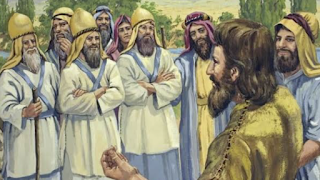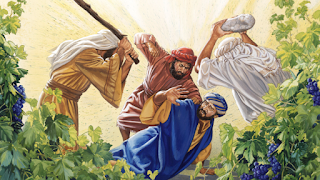This article will probably challenge your beliefs. My own beliefs in regards “the day of the Lord" have shifted over the last several months because in studying the bible, chapter after chapter, book after book, “here a little there a little”, I can’t help but see some connections.
I’m going to share those connections with you and if you read and consider all three articles in this series, you too may see “the day of the Lord” in a totally new light.
So let’s begin where I began my study, in 1 Thessalonians 5.
2 For yourselves know perfectly that the day of the Lord so cometh as a thief in the night.
3 For when they shall say, Peace and safety; then sudden destruction cometh upon them, as travail upon a woman with child; and they shall not escape.
In an effort to understand these verses, I searched the entire bible for the phrase “the day of the Lord” and I found it mentioned 15 times in the Old Testament.
It’s in Isaiah, Jeremiah, Ezekiel, Joel, Amos, Obadiah, Zechariah, Zephaniah and Malachi as well as Acts and Thessalonians.
Now let me take you to Isaiah 13, which is very similar to 1 Thessalonians 5.
Isaiah 13
6 Howl ye; for the day of the LORD is at hand; it shall come as a destruction from the Almighty.
7 Therefore shall all hands be faint, and every man’s heart shall melt:
8 And they shall be afraid: pangs and sorrows shall take hold of them; they shall be in pain as a woman that travaileth: they shall be amazed one at another; their faces shall be as flames.
9 Behold, the day of the LORD cometh, cruel both with wrath and fierce anger, to lay the land desolate: and he shall destroy the sinners thereof out of it.
10 For the stars of heaven and the constellations thereof shall not give their light: the sun shall be darkened in his going forth, and the moon shall not cause her light to shine.
Notice that both 1 Thessalonians 5 and Isaiah 13 mention, not only “the day of the Lord” but a woman travailing in pain to give birth? Clearly these scriptures are linked.
Isaiah 13 also mentions the sun, moon and stars being darkened.
This is important to note because the same cosmological language pops up in other parts of the bible such as Joel, Acts 2 in which Peter quoted Joel and Matthew 24 in which Jesus prophesied the Jewish temple being “thrown down”.
All these scriptures are linked! They’re all talking about the same thing…the day of the Lord!
I’ll explain the significance of that as I go on but for know I want to examine Malachi 4.
Malachi 4
1 For, behold, the day cometh, that shall burn as an oven; and all the proud, yea, and all that do wickedly, shall be stubble: and the day that cometh shall burn them up, saith the LORD of hosts, that it shall leave them neither root nor branch.
5 Behold, I will send you -- Elijah the prophet before the coming of the great and dreadful day of the LORD:
Malachi four is the last chapter of the last book in the Old Testament. As soon as we hit Matthew, we see the fulfilment of Malachi’s prophecy.
Matthew 11
11 Verily I say unto you, Among them that are born of women there hath not risen a greater than John the Baptist…
14 And if ye will receive it, this is Elijah, which was for to come.
Here Jesus identifies John the Baptist as “Elijah” who would come before “the great and dreadful day of the Lord”.
Now let’s backtrack to Matthew 3 to see what John the Baptist said to the Pharisees and Sadducees.
Matthew 3
1 In those days came John the Baptist, preaching in the wilderness of Judea,
2 And saying, Repent ye: for the kingdom of heaven is at hand.
7 But when he saw many of the Pharisees and Sadducees come to his baptism, he said unto them, O generation of vipers, who hath warned you to flee from the wrath to come?
8 Bring forth therefore fruits meet for repentance:
10 And now also the axe is laid unto the root of the trees: therefore every tree which bringeth not forth good fruit is hewn down, and cast into the fire.
John the Baptist spoke with the spirit of Elijah, warning them to “flee from the wrath to come”.
When comparing Malachi 4 and Matthew 3, note the similarities…
Malachi 4:1 “it shall leave them neither root nor branch”
Matthew 3:10 “the axe is laid unto the root of the trees”.
Malachi 4:1 the day of the Lord shall “burn as an oven” and shall “burn them up”.
Matthew 3:10 unfruitful trees shall be “cast into the fire”.
These similarities confirm that both Malachi and Matthew point to the same thing…the day of the Lord.
As we continue through the gospel of Matthew, chapter 21 describes an unfruitful fig tree.
18 Now in the morning as he returned into the city, he hungered.
19 And when he saw a fig tree in the way, he came to it, and found nothing thereon, but leaves only, and said unto it, Let no fruit grow on thee henceforward forever. And presently the fig tree withered away.
The unfruitful fig tree cursed by Christ, represented the Pharisees and Sadducees who refused to recognise Christ as Messiah and “bring forth fruits meet for repentance” in order to “flee from the wrath to come”.
Lets continue in chapter 21…
33 Hear another parable: There was a certain householder, which planted a vineyard, …and let it out to husbandmen, and went into a far country:
34 And when the time of the fruit drew near, he sent his servants to the husbandmen…
35 And the husbandmen took his servants, and beat one, and killed another, and stoned another.
37 But last of all he sent unto them his son, saying, They will reverence my son.
38 But when the husbandmen saw the son, they said among themselves, This is the heir; come, let us kill him, and let us seize on his inheritance.
39 And they caught him, and cast him out of the vineyard, and slew him.
40 When the lord therefore of the vineyard cometh, what will he do unto those husbandmen?
41 They say unto him, He will miserably destroy those wicked men, and will let out his vineyard unto other husbandmen, which shall render him the fruits in their seasons.
43 Therefore say I unto you, The kingdom of God shall be taken from you, and given to a nation bringing forth the fruits thereof.
45 And when the chief priests and Pharisees had heard his parables, they perceived that he spake of them.
Here Jesus was telling the chief priests and pharisees that the kingdom of God would be “taken” from them and given to a spiritual nation, bringing forth fruit.
Thus the “great and dreadful day of the Lord” that shall “burn as an oven” and “leave them neither root nor branch”, as prophesied by Malachi, was to come upon these Jews.
Why such sever judgment? Because they beat, stoned and slew not only God’s servants but God’s own son.
Matthew 22&23 emphasise this point.
Matthew 22
2 The kingdom of heaven is like unto a certain king, which made a marriage for his son.
3 And sent forth his servants to call them that were bidden to the wedding:
6 And the remnant took his servants, and entreated them spitefully, and slew them.
7 But when the king heard thereof, he was wroth: and he sent forth his armies, and destroyed those murderers, and burned up their city.
Matthew 23
37 O Jerusalem, Jerusalem, thou that killest the prophets, and stonest them which are sent unto thee, how often would I have gathered thy children together, even as a hen gathereth her chickens under her wings, and ye would not!
38 Behold, your house is left unto you desolate.
The city of Jerusalem would be “burned up” and their house made “desolate” BECAUSE they killed and stoned God’s prophets.
In the next chapter, Matthew 24, Jesus prophesied the Jewish temple being “thrown down”.
Matthew 24
2 And Jesus said unto them, See ye not all these things? verily I say unto you, There shall not be left here one stone upon another, that shall not be thrown down.
29 -- Immediately after the tribulation of those days (temple being destroyed) shall the sun be darkened, and the moon shall not give her light, and the stars shall fall from heaven, and the powers of the heavens shall be shaken:
34 Verily I say unto you, This generation shall not pass, till all these things be fulfilled.
After Jesus spoke of the temple being "thrown down”, we see the cosmological language associated with “the day of the Lord”.
29 …the sun be darkened and the moon shall not give her light…
Compare that to Isaiah 13
10…the sun shall be darkened in his going forth, and the moon shall not cause her light to shine.
Jesus was no doubt alluding to Isaiah’s prophesy when he gave his olivet discourse.
Such cosmological language makes one think that the “day of the Lord” is at the literal end of the world.
However, notice that AFTER Jesus used such language he said…
34…This generation shall not pass, till all these things be fulfilled.
Indicating that the “day of the Lord” would happen, not at the literal end of the world but within that generation.
In part 2 we'll look at what a generation is. We'll visit another part of the bible where the same cosmological language is used as in Isaiah 13 and Matthew 24. Finally, we'll go back to 1 Thessalonians 5 and examine it in light of Paul's 2nd epistle to the Thessalonians.
Let us each work out our own salvation with fear and trembling, God bless.










No comments:
Post a Comment